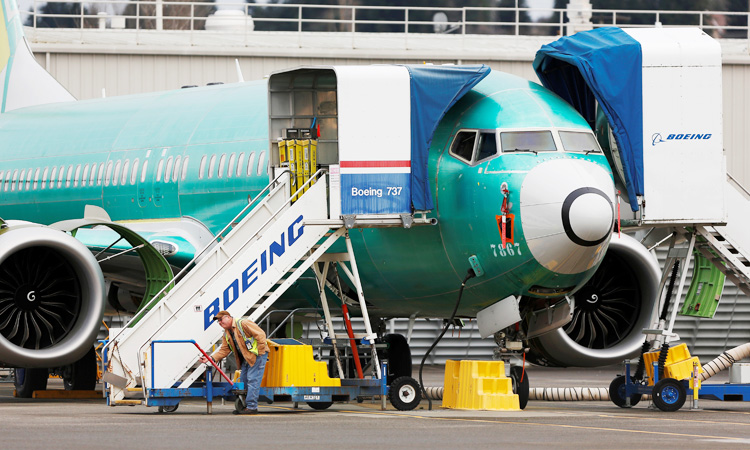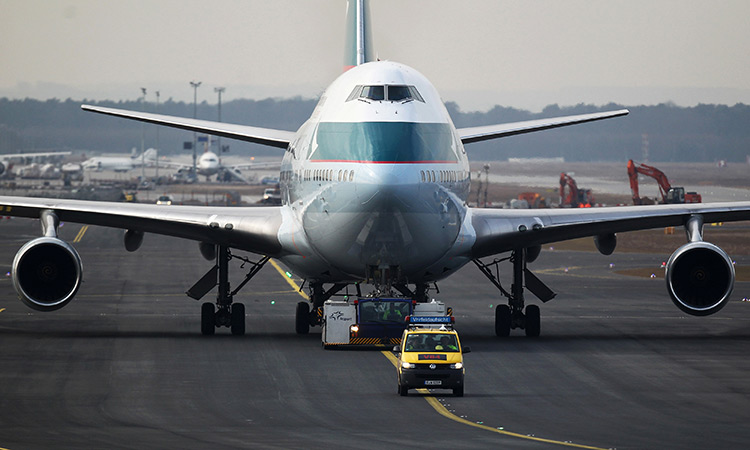GE posts profit above target on vibrant aviation business

A stall of General Electric during a trade expo in Shanghai. Reuters
The results marked a fourth consecutive quarter that GE beat its forecasts, reinforcing a view that Chief Executive Officer Larry Culp was making progress in rescuing the ailing maker of jet engines, power plants, medical imaging equipment and other industrial goods.
“It’s still in a turnaround, but with each quarter of solid results, more people are getting on board with the turnaround story,” said RBC Capital Markets analyst Deane Dray. Shares surged 10.2% to $12.92.
GE also said it would slash 737 MAX engine deliveries to Boeing Co roughly in half this year. But it still set a higher cash target for 2020 of $2 billion to $4 billion - above the $3 billion analysts expect on average. That helped fuel the share rise, said William Baird analyst Nick Heymann, who said the new target marked a confident step up from GE’s 2019 target of $0 to $2 billion in cash.
GE’s 2020 adjusted profit forecast, at 50 cents to 60 cents a share, was less than the 66-cent Wall Street average forecast. But much of the future depends on how events play out with the 737 MAX, the company said.
Culp said on a conference call that GE will slow production of its LEAP 1-B engine for the 737 MAX, but will keep its line running to protect suppliers and prepare for increasing engine output in the second half of the year.
Boeing plans on the jet going back in service at airlines in the second half of 2020, and GE’s forecasts rest on that timing, Culp said. GE plans a deeper outlook discussion for March 4.
GE is trying to tackle its problems by increasing “operational rigor” and lean manufacturing, Culp stressed on the call, suggesting simple measures such as calling on customers and collecting bills will improve performance.
GE’s power division has made progress in these areas, he said, but still needs work: It “will be better next year from a cash perspective but still not positive.”
GE’s adjusted earnings totaled 21 cents a share, topping analyst estimates of 18 cents, according to data from Refinitiv.
Free cash flow from industrial operations was $3.9 billion in the fourth quarter, beating analysts estimates of $3.4 billion, according to Refinitiv data.
GE’s cash flow typically surges in the fourth quarter as workers rush to ship units and book orders by year-end.
Culp has vowed to smooth cash more evenly across the year, but “the expectation was that this will still be an outsized cash flow quarter,” said RBC Capital Markets analyst Deane Dray.
In GE’s power division, revenue fell 16% in the year and orders fell 25%, mainly due to the “non-repeat” of large orders last year, GE said.
In aviation, GE’s largest unit by revenue, orders rose 3% and revenue rose 8% in the year. The unit was, ironically, helped by the MAX grounding since its engines earn little or no profit and not delivering them improves margins, analysts said.
GE reported $2.3 billion in organic industrial free cash flow for 2019, topping its 2019 target. More than $800 million of the cash came from spending only $1.2 billion on restructuring last year, after originally planning to spend more than $2 billion.
“Technically, cash is getting better, but much of the gains come from reducing earlier guidance on costs,” said John Inch, analyst at Gordon Haskett in New York.
GE’s total revenue fell about 1% to $26.24 billion.
Earnings from continuing operations attributable to GE shareholders rose to $663 million, or 7 cents a share, in the fourth quarter ended Dec. 31 from $509 million, or 6 cents, a year earlier, GE said.
Meanwhile, Boeing Co on Wednesday swung to its first annual loss since 1997 as 737 MAX costs doubled to nearly $19 billion, and the plane manufacturer indicated it would again cut production of its bigger 787 Dreamliner aircraft, currently its main source of cash.
Boeing, struggling to restore public confidence and recover from the biggest crisis in company history, has halted production of the once fast-selling 737 MAX which was grounded in March following two deadly crashes. The company is immersed in compensation talks with airline customers and dealing with lawsuits from victims’ families and a criminal probe.
Boeing shares were 1.2% higher, as some analysts had expected an even larger charge for 737 MAX costs. The stock has lost about a quarter of its value since early March 2019.
Reuters







